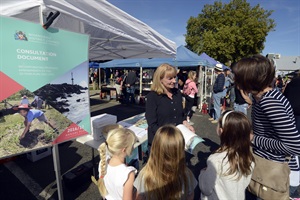Engaging with Your Councillors

There are a number of ways you can be heard by your elected members on council.
Phone or email
Submissions
You may make comment through the formal submission process related to a particular consultation.
See our current consultations
Our District, Your Say
Our District, Your Say is an online community panel that provides an informal way for you to give your feedback and ideas to the council.
Join Our District, Your Say, and be a part of shaping Whanganui’s future.
- take part in the online surveys, questionnaires, and quick polls that interest you
- participate in online focus groups
- we keep your personal details private and you won’t be identified in reports of panel results
- membership is free
We want to hear from residents, ratepayers, business owners, workers, students, volunteers and anyone who is part of our community.
If you have any questions please get in touch with us at ourdistrictyoursay@whanganui.govt.nz
You can unsubscribe from the panel at any time.
Register online